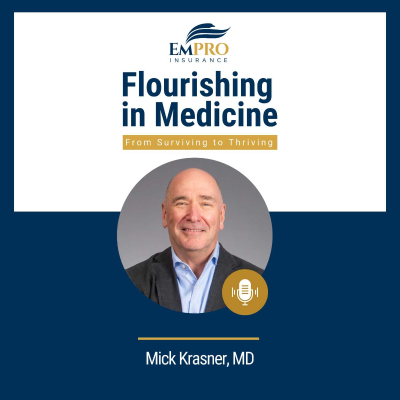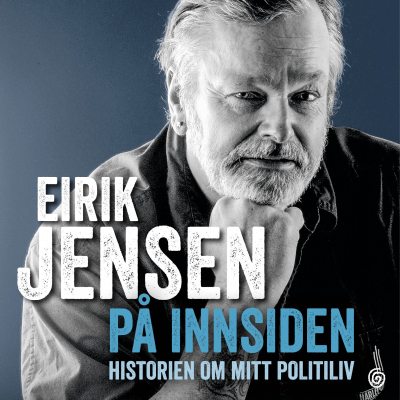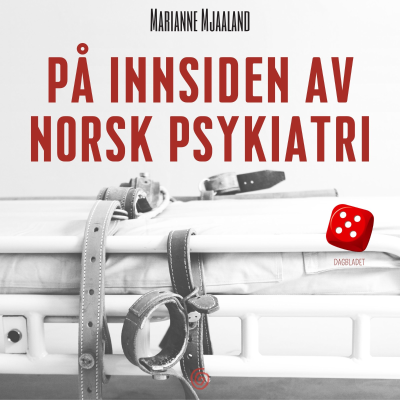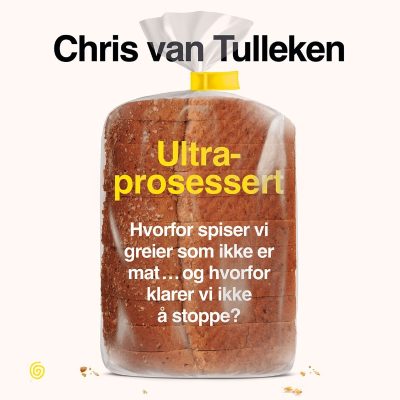
Flourishing in Medicine: From Surviving to Thriving
engelsk
Helse og personlig utvikling
Prøv gratis i 60 dager
99 kr / Måned etter prøveperioden.Avslutt når som helst.
- 20 timer lydbøker i måneden
- Eksklusive podkaster
- Gratis podkaster
Les mer Flourishing in Medicine: From Surviving to Thriving
Flourishing in Medicine: From Surviving to Thriving explores ways that health professionals- physicians, nurses and nurse practitioners, physician assistants, mental health providers, therapists, and others- can truly flourish in the complex and challenging world of health care.The ability for physicians and other health professionals to practice high quality care and attain professional satisfaction and meaning in their work has been under continued challenge. These critically important members of our communities experience ongoing threats to their well-being and hence to the quality of care they deliver. The recent pandemic has only exacerbated changes that have occurred over the preceding years in the practice of medicine, exposing even further the fragility of our imperfect health care systems. This podcast explores the many ways that physicians can and do flourish, including a deeper exploration of what it means to work at the frontier of human frailty and suffering, while applying biomedical science and compassionate care to address the complexities of the human condition. It is the hope that this podcast can help support these health professionals and ultimately translate into improved care of themselves, their patients, and our communities.Your host, Mick Krasner M.D., F.A.C.P, is a Professor Emeritus of Medicine at the University of Rochester School of Medicine and Dentistry. Dr. Krasner has been teaching Mindfulness-Based programs to patients, medical students, and health professionals for more than 23 years, involving over 4000 participants and more than 2000 health professionals, and continues to facilitate Mindfulness-Based Stress Reduction for employees and dependents of the University of Rochester. He was the project director of Mindful Communication: Bringing Intention, Attention, and Reflection to Clinical Practice, sponsored by the New York Chapter of the American College of Physicians, funded by the Physicians Foundation for Health Systems Excellence, with results reported in JAMA in September 2009. This program led to the establishment of Mindful Practice in Medicine Programs at the University of Rochester which he co-directs, offering continuing educational programs to health professionals and educators locally and internationally for the past 13 years, and includes a multi-year teacher training program for future facilitators of Mindful Practice. He has been engaged in a variety of research projects including the investigations of the effects of mindfulness practices on the immune system in the elderly, on chronic psoriasis, and on caregivers of Alzheimer’s patients. His most recent project, The Healer’s Journey, is a documentary film in production that explores the professional identity formation of our newest health professionals, the medical students.Dr. Krasner graduated from the University of California, Berkeley in 1983 and received the Doctor of Medicine degree from the University of California, San Diego School of Medicine in 1987, completing residency in both Internal Medicine and Pediatrics at the University of Rochester School of Medicine and Dentistry where he continued as a full-time faculty member, engaging in medical student and residency education, post-graduate medical education, and research. He has shared his work in peer-reviewed publications, scientific assemblies, workshops, visiting professorships, and intensives throughout the world, focusing primarily on the roots of Hippocratic medicine through the cultivation of attention, awareness, and reflection on the health professional- healing relationship. Having recently left clinical practice, he now devotes all his time to the pursuit of helping physicians and other health professionals flourish.
Alle episoder
34 EpisoderTreating the Wounded Healer with Dr. Stefanie Simmons | Flourishing in Medicine: From Surviving to Thriving #34
Today, we are joined by Dr. Stefanie Simmons, emergency medicine physician, national leader in clinician wellbeing, and Chief Medical Officer of the Dr. Lorna Breen Heroes Foundation, for a conversation about service, systemic change, and reimagining healthcare workers as emotional and intellectual athletes. In this conversation, Stefanie reflects on her unexpected path into medicine. Originating from a family ethic of service and her father's repeated message: our duty is to use our talents to make the world a better place. She traces how her historian's eye for systems and change, combined with early experiences of misalignment between medicine's ideals and realities, led her to focus on the interpersonal, cultural, and systemic dimensions of healing. We also cover: * The tragic story of Dr. Lorna Breen and the foundation's mission to dismantle structural barriers to mental healthcare for clinicians, including invasive licensing and credentialing questions about past mental health treatment * How personal struggles with unaddressed mental health needs and stigma shaped her commitment to changing medical culture and treating healthcare workers with the same care they provide to patients * The foundation's comprehensive work across research, education, collaboration with national organizations, and accelerating solutions through the impact badge program that recognizes institutions removing stigmatizing questions * Her vision for the future: treating healthcare workers as emotional and intellectual athletes who deserve proper training, rest, coaching, and supportive systems designed to help them thrive rather than injure them Throughout, Dr. Simmons embodies moral clarity, vulnerability, and hope—grounded in systems thinking, dedicated to cultural transformation, and committed to a more humane medical profession. She closes with a powerful reframe: in order to reach a state where our healthcare workforce is healthy and thriving, we need to treat ourselves and each other as the intellectual and emotional athletes that we are. Links: LinkedIn: https://www.linkedin.com/in/stefsimmons/ [https://www.linkedin.com/in/stefsimmons/] Lorna Breen Heroes Foundation: https://drlornabreen.org/ [https://drlornabreen.org/] EmPro Website: https://www.myempro.com/ [https://www.myempro.com/] EmPro Peer Support Program: https://www.myempro.com/peer-support/ [https://www.myempro.com/peer-support/] Physician Support Line: +1(888) 409-0141 Physician Support Line Website: https://www.physiciansupportline.com/ [https://www.physiciansupportline.com/] Dr. Krasner's Website: https://mickkrasnermd.com/ [https://mickkrasnermd.com/] Mindful Practice in Medicine Website: https://mindfulpracticeinmedicine.com/ [https://mindfulpracticeinmedicine.com/] Chapters: (00:00) Introduction (00:15) Welcome and Overview (01:21) Path into Medicine (03:19) Dr. Simmon’s Origin Story (04:00) Family Service Ethic (06:00) Her Father's Influence (07:45) Personal Evolution (23:10) Lorna Breen Heroes Foundation (24:30) Dr. Lorna Breen (25:00) Finding the Foundation (26:15) Future Vision (27:00) Physicians as Athletes (29:15) Designing for Wellbeing (29:50) Closing Reflections (30:00) Mindfulness Exercise (32:07) Conclusion
Belonging & Mindfulness Across Medicine with Dr. Ross Carne | Flourishing in Medicine: From Surviving to Thriving #33
Today, we are joined by Dr. Ross Carne. Dr. Ross Carne MBBS, FRACP, MD(Melbourne), MMEd (Dundee), FASLM, LMusA is a neurologist and clinical neurophysiologist who is American Board of Electrodiagnostic Medicine Certified and a Mindfulness Based Stress Reduction (MBSR) Certified Teacher through MTIA. He holds a Doctorate of Medicine investigating brain imaging in epilepsy and a Masters in Medical Education. He is currently an Affiliate Professor at School of Medicine, Deakin University, Geelong, Victoria, Australia. In this conversation, Ross reflects on the formative experiences that drew him into medicine and how these shaped his lifelong desire to relieve suffering and make complexity understandable to others. We also cover: * How mindfulness transformed both his clinical practice and personal life, opening space for authenticity, deeper presence, and creative exploration * His "Belonging in Medicine" program, which helps clinicians reconnect with intention, beauty, and collegial connections across individual, interpersonal, and organizational dimensions * How contemplative practices like attentive listening, acknowledging emotional content, and sharing experiences with colleagues directly counter the components of burnout: depersonalization, emotional exhaustion, and professional inadequacy Throughout, Dr. Carne embodies a creative, curious spirit—open to possibilities, grounded in presence, and dedicated to helping clinicians discover and rediscover meaning, connection, and humanity in their work. He closes with a reminder from Rumi: "On a day when the wind is perfect, the sail just has to open and the world is full of beauty. Today is such a day." Links: Mindfulness Training Institute Australia New Zealand: https://www.mtia.org.au/search-results/teacher?id=51 [https://www.mtia.org.au/search-results/teacher?id=51] EmPro Website: https://www.myempro.com/ [https://www.myempro.com/] EmPro Peer Support Program: https://www.myempro.com/peer-support/ [https://www.myempro.com/peer-support/] Physician Support Line: +1(888) 409-0141 Physician Support Line Website: https://www.physiciansupportline.com/ [https://www.physiciansupportline.com/] Dr. Krasner's Website: https://mickkrasnermd.com/ [https://mickkrasnermd.com/] Mindful Practice in Medicine Website: https://mindfulpracticeinmedicine.com/ [https://mindfulpracticeinmedicine.com/] Chapters: (00:00) Introduction (00:15) Dr. Carne’s path into medicine (01:00) Early experiences with illness and caregiving (02:25) The emotional impact of feeling powerless (04:10) How those moments shaped his calling (06:22) Living with seizures and personal vulnerability (07:45) Finding meaning in the healer’s role (09:12) Mindfulness and the “traveling intention” (10:27) The epiphany that shifted his practice (11:45) First encounter with mindfulness in medicine (12:15) Beginning formal mindfulness training (14:00) Integrating attention and compassion in care (16:30) The science behind awareness and suffering (18:10) The role of presence in clinical encounters (21:00) Belonging and connection in healthcare teams (24:40) What physicians need to thrive (29:34) Creativity, writing, and narrative work (31:48) Final reflections on wonder and curiosity (32:19) Closing thoughts from Dr. Carne (33:07) Guided mindfulness exercise (35:31) Conclusion
Building Resilient Clinicians Through Mindfulness with Dr. Jodi Jackson | Flourishing in Medicine: From Surviving to Thriving #32
Today, we are joined by Dr. Jodi Jackson, Professor of Pediatrics in the Division of Neonatology at Children's Mercy-Kansas City/UMKC School of Medicine. Through a clinical partnership, Dr. Jodi Jackson has served as Medical Director of the NICU at AdventHealth Shawnee Mission (AHSM) since 2007. She was a founding member of the Physician Wellness program and Meaning in Medicine program with AHSM. From 2010 to present, she has been training in Mindful Practice, Quality of Care, Quality of Caring and Resilience, and is now certified to teach Mindfulness in Medicine through the Advanced Teacher Training Program for Mindful Practice in Medicine (MPIM), University of Rochester School of Medicine. She presently serves on faculty and the advisory board for the Mindful Practice in Medicine (MPIM) program, University of Rochester School of Medicine and Dentistry. In this conversation, Dr. Jackson reflects on her unconventional path to medicine, driven not by a childhood dream of becoming a doctor, but by deep curiosity about how the body and world work, and a desire for grounded understanding amid family health anxieties. We also cover: * How her journey to medicine was guided by genuine curiosity rather than a predetermined vision * How the Mindfulness Scholars Program at UMKC fosters intergenerational learning, narrative sharing, psychological safety, and demonstrable improvements in wellbeing * How combining the wisdom of mindfulness and Enneagram teachings creates powerful tools for self-discovery, noticing where we're stuck, and navigating human relationships with greater compassion * Throughout, Dr. Jackson embodies the way of the teacher. She is open but not attached to outcomes, committed to walking the path, and dedicated to helping shape a more conscious, humane generation of health professionals. Links: Mindful Practice in Medicine (MPIM): https://mindfulpracticeinmedicine.com/about/who-we-are/ [https://mindfulpracticeinmedicine.com/about/who-we-are/] UMKC Mindfulness Scholars Program: https://libguides.library.umkc.edu/c.php?g=1441182&p=10704649 [https://libguides.library.umkc.edu/c.php?g=1441182&p=10704649] EmPro Website: https://www.myempro.com/ [https://www.myempro.com/] EmPro Peer Support Program: https://www.myempro.com/peer-support/ [https://www.myempro.com/peer-support/] Physician Support Line: +1(888) 409-0141 Physician Support Line Website: https://www.physiciansupportline.com/ [https://www.physiciansupportline.com/] Dr. Krasner's Website: https://mickkrasnermd.com/ [https://mickkrasnermd.com/] Mindful Practice in Medicine Website: https://mindfulpracticeinmedicine.com/ [https://mindfulpracticeinmedicine.com/] Chapters: (00:00) Introduction (01:15) An unconventional path to medicine (04:00) Choosing Neonatology (07:00) The Impact of Mindful Practice (10:30) Building the Mindfulness Scholars Program (14:00) Training Students and Faculty Together (17:30) Culture Change in Medical Education (21:00) The Hidden Curriculum (24:00) Enneagram and Mindfulness (28:00) Understanding Patterns and Compassion (31:00) Tools for Healing and Growth (36:00) The Enneagram & Mindfulness (42:45) Guided Mindfulness Practice (45:00) Conclusion
Mindfulness in Swedish Medicine with Dr. Whitmer Jacobsson & Dr. Bååthe | Flourishing in Medicine: From Surviving to Thriving #31
Today, we are joined by Dr. Anamaria Whitmer Jacobsson, MD, a senior OB/GYN surgeon at Varberg and Kungsbacka Hospitals in Sweden, and Dr. Fredrik Bååthe, PhD, a senior researcher and lecturer at the Institute of Stress Medicine in Gothenburg and guest researcher at the Legeforskningsinstituttet in Oslo. In the conversation, Drs. Whitmer Jacobsson and Bååthe share their deeply personal “why,” exploring how formative experiences shaped their values of service, connection, and human potential. We also cover: * Why traditional debriefing can backfire when teams are outside their window of tolerance and what to do instead * How trauma-informed, appreciative questions help clinicians and patients heal, learn, and reconnect after crises * What sustainable healthcare looks like in practice, with lessons from a Swedish clinic achieving low burnout and high fulfillment for over 20 years Links: Dr. Whitmer Jacobsson’s LinkedIn: se.linkedin.com/in/anamaria-whitmer-jacobsson-b69b966b [http://se.linkedin.com/in/anamaria-whitmer-jacobsson-b69b966b] Dr. Bååthe’s LinkedIn: / [https://www.linkedin.com/in/fredrik-b%C3%A5%C3%A5th-10682a89/?originalSubdomain=se]www.linkedin.com/in/fredrik-b%C3%A5%C3%A5th-10682a89/ [http://www.linkedin.com/in/fredrik-b%C3%A5%C3%A5th-10682a89/] Claritatis AB: https://claritatisab.com/new-page-1 [https://claritatisab.com/new-page-1] A.L.S.O. Scandinavia: https://www.also-scandinavia.com/kurs-i-sverige/ [https://www.also-scandinavia.com/kurs-i-sverige/] SLF: https://slf.se/in-english/ [https://slf.se/in-english/] SFOG: https://www.sfog.se/kunskap/psykosocial-ob-gyn-samt-sexologi-pos-arg/ [https://www.sfog.se/kunskap/psykosocial-ob-gyn-samt-sexologi-pos-arg/] ISM: https://tinyurl.com/5n7ce2d5 [https://tinyurl.com/5n7ce2d5] LEFO: https://tinyurl.com/3mv2nbzy [https://tinyurl.com/3mv2nbzy] EmPro Website: https://www.myempro.com/ [https://www.myempro.com/] EmPro Peer Support Program: https://www.myempro.com/peer-support/ [https://www.myempro.com/peer-support/] Physician Support Line: +1(888) 409-0141 Physician Support Line Website: https://www.physiciansupportline.com/ [https://www.physiciansupportline.com/] Dr. Krasner's Website: https://mickkrasnermd.com/ [https://mickkrasnermd.com/] Mindful Practice in Medicine Website: https://mindfulpracticeinmedicine.com/ [https://mindfulpracticeinmedicine.com/] Chapters: (00:00) Introduction (02:00) The Why: Service and Human Connection (10:00) From Industry to Healthcare: Unlocking Human Potential (20:00) Mindful Practice and the Birth of the Swedish Model (30:00) Complexity Science and Organizational Healing (37:00) Trauma-Informed, Appreciative Inquiry in Practice (43:00) Sustainable Healthcare in Sweden (47:00) Expanding to Michigan and Beyond (51:00) Vision for the Future of Care (55:00) Conclusion
From Anatomy Lab to Arts & Humanities with Dr. Elizabeth Gaufberg | Flourishing in Medicine: From Surviving to Thriving #30
Today, we are joined by Dr. Elizabeth Gaufberg, MD, MPH, an Associate Professor of Medicine and Psychiatry at Harvard Medical School and Director of Professional and Academic Development at the Cambridge Health Alliance. In the conversation, Dr. Gaufberg shares how a formative anatomy lab moment sparked her lifelong commitment to reflective practice and using the arts and humanities to cultivate essential clinical skills. We also cover: * How the Cambridge Integrated Clerkship model preserves patient-centeredness through longitudinal relationships and relational learning * Using "third things" like visual art and poetry to teach observation, bias awareness, teamwork, and tolerance for ambiguity * Practical approaches for bringing arts-based reflection into clinical settings to support psychological safety and professional flourishing Links: Dr. Elizabeth Gaufberg Faculty Profile: https://postgraduateeducation.hms.harvard.edu/faculty-staff/elizabeth-gaufberg [https://postgraduateeducation.hms.harvard.edu/faculty-staff/elizabeth-gaufberg] Cambridge Health Alliance: https://www.chacmc.org/new-page [https://www.chacmc.org/new-page] Cambridge Health Alliance PAD: https://chacpad.org/staff [https://chacpad.org/staff] Dr. Gaufberg LinkedIn: https://www.linkedin.com/in/elizabeth-gaufberg-503a0b7a/ [https://www.linkedin.com/in/elizabeth-gaufberg-503a0b7a/] AAMC FRAHME: https://www.aamc.org/about-us/mission-areas/medical-education/frahme [https://www.aamc.org/about-us/mission-areas/medical-education/frahme] EmPro Website: https://www.myempro.com/ [https://www.myempro.com/] EmPro Peer Support Program: https://www.myempro.com/peer-support/ [https://www.myempro.com/peer-support/] Physician Support Line: +1(888) 409-0141 Physician Support Line Website: https://www.physiciansupportline.com/ [https://www.physiciansupportline.com/] Dr. Krasner's Website: https://mickkrasnermd.com/ [https://mickkrasnermd.com/] Mindful Practice in Medicine Website: https://mindfulpracticeinmedicine.com/ [https://mindfulpracticeinmedicine.com/] Relevant Publications: Hirsh D, Gaufberg E, Ogur B, Cohen P, Krupat E, Cox M, Pelletier S, Bor D. Educational outcomes of the Harvard Medical School-Cambridge integrated clerkship: a way forward for medical education. Acad Med. 2012 May;87(5):643-50. doi: 10.1097/ACM.0b013e31824d9821. PMID: 22450189. Gaufberg E, Hirsh D, Krupat E, Ogur B, Pelletier S, Reiff D, Bor D. Into the future: patient-centredness endures in longitudinal integrated clerkship graduates. Med Educ. 2014 Jun;48(6):572-82. doi: 10.1111/medu.12413. Epub 2014 Apr 9. PMID: 24713035. Chapters: (00:00) Introduction (03:00) Origin Story and Path to Medicine (08:00) Why Psychiatry After Internal Medicine (10:00) Formative Anatomy Lab Moment (14:00) The Arts and Humanities in Medical Education (24:00) Bringing Arts-Based Reflection to Clinical Teams (29:00) Cambridge Integrated Clerkship Model (38:00) Challenges and Boundary Issues in Relational Learning (43:00) Hypothetical Impact on Medical Culture (49:00) Personal Well-Being Practices (52:00) Conclusion and Reflection Exercises
Velg abonnementet ditt
Premium
20 timer lydbøker
Eksklusive podkaster
Gratis podkaster
Avslutt når som helst
Prøv gratis i 60 dager
Deretter 99 kr / month
Premium Plus
100 timer lydbøker
Eksklusive podkaster
Gratis podkaster
Avslutt når som helst
Prøv gratis i 60 dager
Deretter 169 kr / month
Prøv gratis i 60 dager. 99 kr / Måned etter prøveperioden. Avslutt når som helst.

































